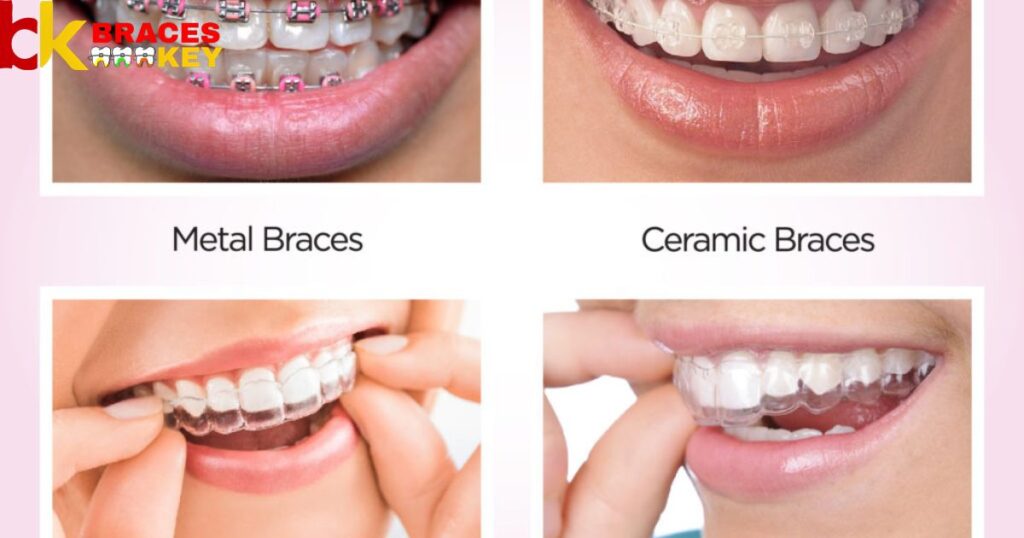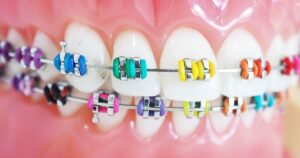Braces are magical tools that help straighten our teeth and give us a confident smile. But have you ever wondered, “Do braces hurt?”. In this article, we will explore the world of braces and find out how much they hurt, using a particular scale to measure it. So, learn about braces and whether they’re as scary as they seem.
Imagine waking up one day with a set of braces on your teeth. You’re excited about the prospect of a beautiful smile but also worried about the pain. How much do braces hurt? Let’s uncover the truth together.
The discomfort from braces varies for each person, but it’s generally manageable. It’s like moderate pressure rather than intense pain on a scale. You may experience soreness after adjustments, but it improves with time. Good oral care and soft food can help ease any discomfort.
Understanding Braces
Braces are orthodontic devices designed to align and straighten teeth. They consist of brackets, wires, and sometimes rubber bands. Braces apply gentle pressure to your teeth over time, encouraging them to move into their proper positions. While they can work wonders for your smile, they may also cause some discomfort along the way.
How Do Braces Work
Braces use a combination of brackets and wires to guide your teeth into their desired positions. The frames are attached to your teeth, and the cables are threaded through them. Over time, the orthodontist adjusts the wires to move your teeth gradually. This process can be uncomfortable, but it’s essential for achieving a straight smile.
Types of Braces

Different types of braces are available, including traditional metal braces, ceramic braces, and clear aligners like Invisalign. Each class has pros and cons, and the level of discomfort can vary depending on the type you choose.
The Pain Scale
To help you understand how much braces hurt, we’ll introduce you to the “Brace Pain Scale.” This scale will help you visualize and measure the discomfort you may experience during your orthodontic journey.
The Brace Pain Scale
Now that we understand what braces are, let’s delve deeper into the Brace Pain Scale, which will give you a clear picture of how much discomfort to expect during different stages of your orthodontic treatment.
The Initial Adjustment
The first few days after getting or adjusting braces can be the most uncomfortable. Your teeth are just starting to move, and your mouth needs to get used to this new sensation. You may experience some soreness and irritation during this phase, but it’s generally manageable with over-the-counter pain relievers and soft foods.
Ongoing Adjustments
You’ll have periodic appointments with your orthodontist throughout your orthodontic treatment for adjustments. These appointments may cause discomfort but are usually less intense than the initial adjustment. The pain is a sign that your teeth continue moving, a positive step toward your beautiful smile.
Dealing with Braces Sores
Sometimes, braces can cause sores or ulcers in your mouth due to the brackets or wires rubbing against your cheeks, lips, or tongue. These sores can be painful, but there are ways to alleviate the discomfort and prevent them from happening too often.
Taking Care of Your Braces

Taking care of your braces is essential for a successful orthodontic journey. Remember to brush and floss diligently to keep your teeth and braces clean. Avoid hard and sticky foods that can damage them. Regularly follow up with your orthodontist for adjustments to ensure your smile stays on track.
Brushing and Flossing
Brushing and flossing are super important when you have braces. Use a special brush to clean around the brackets and wires. Flossing can be tricky, but tools like floss threaders help you get between the wires and keep your teeth clean.
Eating the Right Foods
Some foods can be tricky with braces. Avoid hard or sticky stuff like chewing gum and popcorn, as they can damage your braces. Stick to softer foods like mashed potatoes, yogurt, and pasta, which are braces-friendly.
Regular Check-Ups
You’ll need to visit your orthodontist regularly, usually every few weeks, for adjustments. These visits are essential to ensure your braces are doing their job correctly. Your orthodontist will also check if you clean your teeth and braces.
The Wonderful Benefits of Braces
Braces offer remarkable benefits for your oral health. They straighten crooked teeth, improving your smile’s appearance. They also enhance bite alignment, reducing discomfort and potential long-term issues. Plus, braces can boost your self-confidence, making you smile brighter daily.
A Beautiful Smile
A beautiful smile has the power to brighten anyone’s day. It radiates warmth and positivity, instantly connecting people. A simple curve of the lips can convey happiness, kindness, and confidence. A beautiful smile is a universal language that transcends barriers and spreads joy effortlessly.
Better Oral Health
Better oral health is essential for a brighter smile and overall well-being. Regular brushing, flossing, and dental check-ups can prevent issues like cavities and gum disease. Drinking water and limiting sugary snacks also contribute to a healthier mouth. Remember, daily care goes a long way in preserving your pearly whites.
Improved Bite

Sometimes, braces help fix bite problems, like when your upper and lower teeth don’t fit together correctly. Correcting your bite can make eating and speaking more accessible and more comfortable. With these tips on taking care of your braces and the fantastic benefits they bring, you’re all set to rock your orthodontic journey.
Conclusion
In conclusion, let’s wrap up what we’ve learned about braces and the question, “How much do braces hurt on a scale?” I want to clarify this for all of you amazing fifth-graders out there.
Braces may sometimes feel uncomfortable, especially when you get them or after they are adjusted. It’s like your teeth are having a little adventure, moving around to get in line. But guess what? This discomfort is temporary, like a small bump to having a fantastic smile.
The Brace Pain Scale we discussed helps us understand that this discomfort is not too bad. It’s like when you have a minor scrape or a tiny bruise; it stings for a bit, but then it gets better.
So, don’t worry too much if you’re getting braces or thinking about them. They might make your teeth a bit sore now and then, but it’s all part of the process to have straight and healthy teeth. Plus, you’ll get used to it, and in the end, you’ll have a super-duper, confident smile that will light up the room! So, keep smiling, be brave, and remember, braces are your secret helpers on the journey to a beautiful smile.
Meta Description
Discover how braces work and whether they hurt on a scale. Get insights on caring for braces and the benefits they bring.








